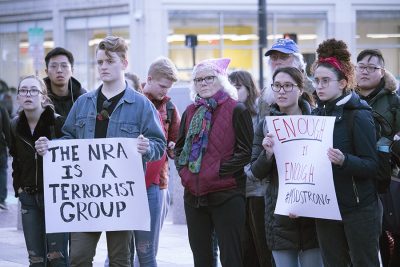
In the midst of national uproar against gun violence, members of Boston University’s community have been critical about the lack of transparency surrounding the school’s investment ties to firearms manufacturers.
The Executive Committee of BU’s Board of Trustees established a Working Group on Investment in Civilian Gun Manufacturers in January 2013, following the Sandy Hook Elementary School shooting, according to the Trustees’ website.
The Group recommended that BU consider its investments in firearms manufacturers within the context of the university’s “socially responsible investment policies” and that the university make no new direct investments in them, but the Executive Committee decided against divesting in December 2014.
BU Earth and Environment professor Nathan Phillips has been vocal about the need for transparency from BU administrators and the Board of Trustees through protests and social media engagement.
“We can’t be profiting off of bloodshed,” Phillips said. “Whenever there’s a mass shooting, statistics show that actually gun sales go up. BU profits off of events like what happened in Florida — that’s a reality, and it’s morally wrong.”
Phillips said he thinks a statement issued by the Board of Trustees, which was published in a 2015 BU Today article, gave no justification for why the university decided against divesting.
The statement is broken up into three parts:
First, the Board said when it is asked to divest from an industry or company, “it is being asked to express an opinion …” that is often “not directly related to the operations of the University.”
Second, it said divestment actions based on social or political principles could represent an encumbering institutional position that may dampen discussion of alternative views, and should be rare.
Third, it said those rare circumstances only exist when actions by firms are unacceptable or when potentially negative consequences of the decision “are clearly outweighed by the importance of taking the divestment action in order to lessen or mitigate the social harm.”
“Even those principles, to me, completely don’t justify their decision not to divest in firearms,” Phillips said. “We should all be concerned about gun violence occurring in any school, public place or campus like BU.”
In a letter to The Daily Free Press, BU President Robert Brown said the university currently has no direct investments in civilian firearm manufacturers. Phillips, however, said investments do not necessarily have to be “direct.”
“Often what happens is that universities invest their endowments in what are called mixed funds or index funds,” Phillips said. “We can screen out gun manufacturers. If we were serious about this, we could tell our investment managers to divest from those manufacturers who produce assault weapons.”
Attempts to reach several members of the Advisory Committee on Socially Responsible Investing for comment were unsuccessful.
Several BU students shared different views about BU’s potential ties with firearms manufacturers, but most agreed the university should be more transparent.
Morgan Scott, a College of Arts and Sciences sophomore, said she would be indifferent if BU had indirect ties to firearms manufacturers, but added that she was unsure as to why the university would be invested in such an industry.
“I don’t know why a university would feel the need to back that,” Scott said. “I don’t understand what the connection between education and firearms is, so that seems a little weird to me.”
Grace Yang, a CAS junior, said she thinks big schools tend to focus on profits, and that she would not be surprised if BU was indirectly invested in firearms companies.
“Even though it’s an institution that caters to people, I think sometimes they do have a mentality of ‘forget the people — finances first,’” Yang said.
George Abunaw, a College of Communication freshman, said he is unsure about whether or not BU should break potential ties with gun manufacturers. He said part of his reasoning was that he had no idea what the specific details were.
“I feel they need to be public about it — especially in this time when so many people are hurting,” Abunaw said.
Abunaw added that he would like to see an opportunity for students to ask questions about the decisions of their school.
“Another statement isn’t going to do much,” Abunaw said. “[President Brown] can say what he wants, but like we’ve seen so many times, if people are asking questions, he’s not going to be able to dodge away from the truth.”
College of Engineering freshman Brandon Miller said he would prefer for BU to not be invested in gun manufacturers. Miller said it might be time to rethink the Board of Trustees’ initial decision, and that the BU community ought to know about these positions.
“Your investments say a lot about what you stand for,” Miller said. “[For] people who are choosing a college, that’s a big deal to them.”

